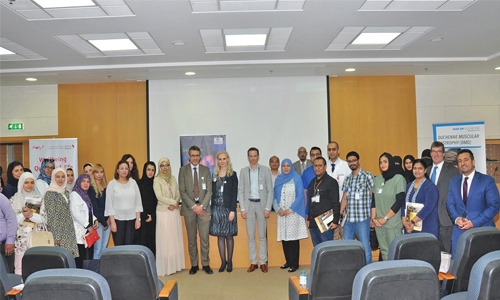Call for joint action to combat rare diseases
Manama : Dr Cristina Skrypnyk, Medical Genetics Consultant and Assistant Professor at the Arabian Gulf University (AGU), called for joint national efforts to prepare a plan to deal with rare diseases and to commence preparing a national rare diseases database as a first step to deal with these diseases that cause severe suffering and complications resulting in death.
This came during the First Scientific Seminar on Rare Diseases organised by Al Jawhara Al Ibrahim Centre – AGU on Monday at its headquarters in Manama. It was held under the slogan “Translating Research into Clinical Practice” in the context of the annual World Rare Disease Day, with the participation of over 60 specialists comprised of doctors, researchers and healthcare professionals from various health authorities in the Kingdom of Bahrain.
The main papers in this seminar were presented by Dr Skrypnyk, Dr Basel Al Hayki, in addition to Paediatric Neurology Consultant from University Medical Centre Ljubljana, Slovenia, Dr Damjan Osredkar, who is participating in the seminar with the support of GENPHARM.
“There are over 7,000 rare diseases around the world, affecting 300 million people. Rare diseases, as defined by the European Commission for Public Health, are “life-threatening or chronically debilitating diseases which affect so few people that combined efforts are needed to identify them.”
Rare diseases are defined as those that affect less than 1 in 2,000 people. Rare diseases include many health problems with multiple complications on the nervous and musculoskeletal systems, the heart, kidneys and other organs. These diseases have negative effects on pregnancy and lead to premature death of newborns,” she said.
“Over 40% of people with rare diseases around the world are not fully aware of the cause of their suffering, which is due to little awareness of genetic diagnosis. Currently, we have neither a national record of rare cases nor the number of individuals who have been diagnosed. In the absence of specialists in genetic diagnosis, we are also not sure that those who have been diagnosed have been diagnosed accurately,” Dr Skrypnyk continued. She also addressed the most important scientific breakthroughs in the treatment of genetic disorders in the last decade, which found many helpful treatments for rare diseases.
On his behalf, Dr Basil Al-Hayki said that the diagnosis of rare diseases is a great challenge to any doctor. “Diagnosis is often delayed, which hinders access to appropriate treatment, and leads to the development of complications,” he explained.
Dr Al Hayki discussed details of a study conducted on more than 400 chronic kidney failure patients who are treated with haemodialysis and peritoneal dialysis in Bahrain. This study, which lasted nearly a year, aimed to identify the characteristics of each case which was surveyed, in order to develop more effective treatments for each case.
Dr Al-Hayki revealed that the study was able to detect three cases of a rare disease (Fabry), which causes an imbalance in the metabolic system, leading to significant complications if not diagnosed and treated early – primarily chronic kidney failure, heart rhythm disorder, heart failure and stroke. Children in its early stages often suffer from severe pains, whose root is often unknown, causing them to suffer in the absence of an appropriate diagnosis.
Related Posts

